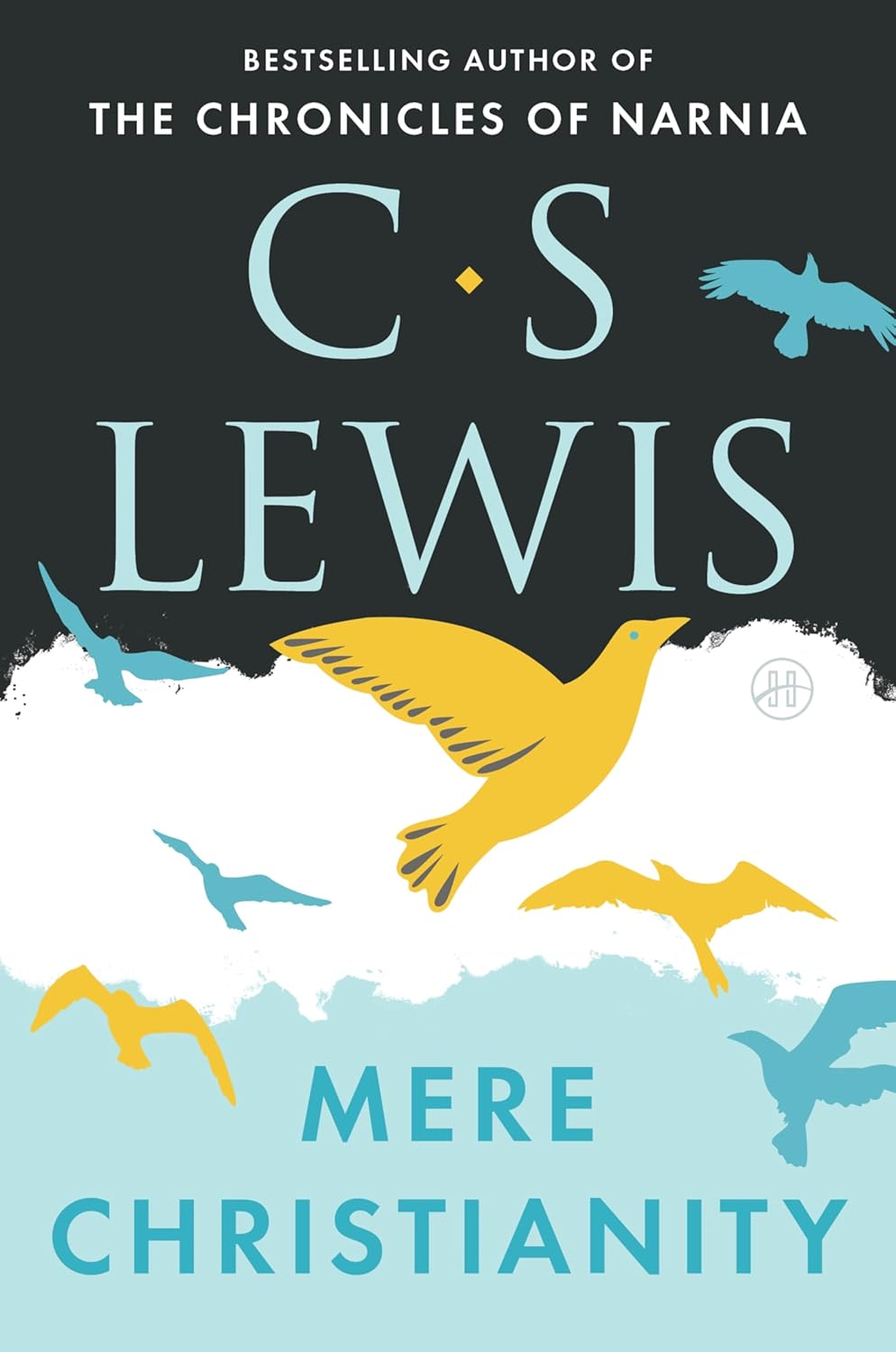Mere Christianity By C.S. Lewis Book Review
If you click a link in this blog post and make a purchase I may receive a sponsored commission at no extra cost to you and this will help us to continue sharing this ministry.
There are books you read once and forget by next week and then there are books that linger, that quietly sit in your mind and reshape the way you see the world. C.S. Lewis’s Mere Christianity is one of those books.
It’s the kind of book that doesn’t just tell you what to believe it invites you to think, to wrestle, and to rediscover the beauty of faith in a way that feels both intelligent and deeply personal.
For decades Mere Christianity has been a lifeline for skeptics, seekers, and believers alike. Whether you’re someone questioning your faith or simply wanting to understand why you believe what you do, this book reads like a patient conversation over coffee with one of the sharpest minds of the 20th century a man who knew both doubt and belief intimately.
So let’s take a closer look at this timeless classic, why it still resonates today, and what makes it one of the most important Christian books ever written.

CLICK HERE TO BUY BOOK ON AMAZON
The Story Behind The Book
Before it was a book, Mere Christianity was a series of radio talks.
During World War II, when bombs were falling on London and fear gripped the nation, the BBC invited C.S. Lewis then an Oxford professor and former atheist turned Christian to speak to the British public about faith.
Imagine it: people huddled around radios in their darkened living rooms, listening as Lewis calmly and clearly explained the heart of Christianity in a way that made sense. No preaching, no shouting just thoughtful, honest reasoning.
Those talks were later collected and expanded into what we now know as Mere Christianity. And that context matters because you can still feel the compassion and clarity of a man speaking to people in the middle of chaos, offering them hope and reason to believe.
Who Was C.S. Lewis?
C.S. Lewis wasn’t your typical theologian. He was a literary scholar, an Oxford don, a storyteller, and a man who wrestled deeply with faith.
For years, Lewis was an atheist. He once described himself as “the most reluctant convert in all England.” But through deep thinking, honest searching, and conversations with close friends (including J.R.R. Tolkien), Lewis came to believe that Christianity made the most sense of the world its beauty, its pain, its longing, and its purpose.
And that’s what makes him such a compelling voice. He didn’t grow up assuming faith he reasoned his way toward it. That journey shines through every page of Mere Christianity.
What Does “Mere Christianity” Mean?
The phrase “mere Christianity” might sound strange at first, but Lewis explains it beautifully.
He wasn’t trying to create a new denomination or promote one version of Christianity over another. Instead, he wanted to explain the core truths that all Christians share the beliefs that unite us rather than divide us.
He compares Christianity to a great house with many rooms. The “hallway” represents the shared faith belief in God, in Jesus Christ, in His death and resurrection, and in the moral and spiritual truths that come from that.
The “rooms” are the different denominations Catholic, Protestant, Orthodox, and so on. Lewis wasn’t telling anyone which room to enter; he just wanted to help people step into the house in the first place.
That’s what “mere Christianity” means not minimal Christianity, but essential Christianity.
The Structure – Four Books in One
Mere Christianity is divided into four parts, each building on the last like a conversation that deepens with every chapter.
Let’s walk through them.
Book 1: Right and Wrong as a Clue to the Meaning of the Universe
Lewis starts, interestingly, not with the Bible but with something universal: morality.
He observes that across cultures, people have a sense of right and wrong. We may disagree about the details, but everyone seems to believe in some kind of moral standard a sense that some things are truly good and others truly evil.
He calls this the “Law of Human Nature,” and he argues that it points to something (or Someone) beyond ourselves.
If there’s a moral law, then there must be a moral Lawgiver.
Lewis doesn’t jump straight to “the God of the Bible” he builds the case step by step, guiding the reader logically from the existence of right and wrong to the existence of a moral, personal God.
It’s brilliant, not just because it’s reasoned, but because it respects the reader’s intellect. He doesn’t demand blind faith; he invites thoughtful faith.
Book 2: What Christians Believe
Once he’s laid the foundation that there is a God, Lewis moves on to what Christianity specifically teaches about Him.
He explains who Jesus is not just a great moral teacher, but the Son of God who came to earth to rescue humanity from sin.
This section includes one of Lewis’s most famous arguments sometimes called the “Liar, Lunatic, or Lord” trilemma.
He writes:
“A man who was merely a man and said the sort of things Jesus said would not be a great moral teacher. He would either be a lunatic on the level with the man who says he is a poached egg or else he would be the Devil of Hell. You must make your choice. Either this man was, and is, the Son of God; or else a madman or something worse.”
It’s one of the most powerful and memorable defenses of Jesus’ divinity ever written.
Lewis invites the reader to take Jesus seriously not just as an inspiring figure, but as the living God who came to reconcile us to Himself.
Book 3: Christian Behavior
In the third section, Lewis gets practical.
He explores what Christian living actually looks like the moral and ethical transformation that follows genuine faith.
He talks about virtues like charity, forgiveness, humility, and chastity, but in ways that are refreshingly honest and real.
He doesn’t moralize or scold he reasons and explains.
For example, when discussing forgiveness, he admits it’s one of the hardest commands to follow but reminds readers that forgiving others is essential because we ourselves have been forgiven by God.
One of his most famous lines comes from this section:
“Do not waste time bothering whether you ‘love’ your neighbor; act as if you did. As soon as we do this, we find one of the great secrets. When you are behaving as if you loved someone, you will presently come to love him.”
That’s the beauty of Lewis’s writing he doesn’t just describe Christianity as belief; he shows it as a way of living that transforms the heart.
Book 4: Beyond Personality – Or First Steps in the Doctrine of the Trinity
The final section dives into deeper theological waters.
Here, Lewis explores the nature of God, the concept of the Trinity, and what it means for us to become “new creatures” in Christ.
He uses vivid analogies describing spiritual growth like a statue being carved into a living person, or like tin soldiers being turned into real humans.
He explains how the life of God the life of Christ begins to flow in us when we surrender to Him.
It’s not about moral improvement alone; it’s about transformation.
As Lewis writes,
“The Son of God became a man to enable men to become sons of God.”
It’s a breathtaking reminder that Christianity isn’t just about being good it’s about being reborn.
Lewis’s Writing Style – Simple Yet Profound
What makes Mere Christianity so special isn’t just the depth of its ideas, but how simply Lewis expresses them.
He writes like a friend, not a professor. His tone is warm, witty, and conversational sometimes even playful. He uses stories, analogies, and everyday examples to explain big theological truths.
For instance, he compares faith to learning to swim something that takes both trust and practice. He compares the Christian life to joining a dance one that becomes more graceful as you follow the rhythm of the Spirit.
Even when he’s tackling complex ideas like the Trinity or free will, he makes them understandable without watering them down.
That’s the genius of Lewis: he makes truth accessible without making it shallow.
The Timeless Relevance
You might think that a book first published in 1952 would feel dated but Mere Christianity is the opposite.
It feels as fresh and necessary now as ever.
We live in a world that’s skeptical of truth, divided by ideology, and hungry for meaning. Lewis’s words cut through all of that. He reminds us that Christianity isn’t a political system, a moral checklist, or a cultural label it’s about a relationship with a real and living God who loves us.
His rational approach appeals to skeptics, but his warmth reaches the heart.
He never talks down to the reader; he meets them where they are whether they’re a doubter, a seeker, or a lifelong believer in need of renewal.
Favorite Quotes That Stay With You
C.S. Lewis had a way of capturing profound truths in simple, unforgettable sentences. Here are just a few that linger long after you close the book:
-
“If I find in myself desires which nothing in this world can satisfy, the only logical explanation is that I was made for another world.”
-
“Faith… is the art of holding on to things your reason has once accepted, in spite of your changing moods.”
-
“Humility is not thinking less of yourself, but thinking of yourself less.”
-
“A proud man is always looking down on things and people; and, of course, as long as you are looking down, you cannot see something that is above you.”
-
“Though our feelings come and go, His love for us does not.”
Each of these could be a devotional all on its own. They remind you that Lewis wasn’t just a thinker he was a believer whose faith touched both head and heart.
Who Should Read It
Mere Christianity is for anyone who’s ever had questions about faith whether you’re a believer wanting to deepen your understanding or someone exploring Christianity for the first time.
It’s also a great book for skeptics or intellectuals who’ve dismissed Christianity as irrational. Lewis demonstrates that faith and reason are not enemies they’re partners.
If you’ve ever wrestled with doubt, if you’ve ever wanted to know why Christianity makes sense, or if you’ve ever wanted to love God with both your mind and your heart this book is for you.
Why It Still Changes Lives
Decades after its release, Mere Christianity continues to lead people to faith.
From students in college classrooms to pastors in pulpits, from skeptics who found God through its pages to lifelong Christians who found new joy in their faith its impact is enormous.
And maybe that’s because Lewis doesn’t just tell you what to think he teaches you how to think about God.
He helps you see that Christianity isn’t blind belief; it’s the most reasonable explanation for life, love, morality, and the longing in every human heart.
He shows that faith isn’t the absence of reason it’s the fulfillment of it.
The Heart of the Message
At its core, Mere Christianity is about truth, love, and transformation.
It reminds us that God isn’t asking us to pretend to be good people He’s inviting us to become new people.
Lewis writes,
“Give me all of you. I don’t want so much of your time and so much of your money and so much of your work: I want you. All of you.”
That’s the heartbeat of the gospel. And that’s what makes Mere Christianity such a life-changing book it brings the reader face to face with the God who wants all of us, not just our belief, but our hearts.
Conclusion: Faith Made Real
Reading Mere Christianity feels like walking through a conversation that starts with curiosity and ends with worship.
You start by thinking you’re reading a clever argument for God and by the time you reach the end, you realize you’ve encountered Him.
C.S. Lewis doesn’t just want to convince you that Christianity is true he wants to help you fall in love with the One who is Truth Himself.
It’s not just a book to be read; it’s a journey to be experienced. And every time you return to it, you’ll find something new some fresh reminder that faith is not just reasonable, but deeply, beautifully real.
Because as Lewis would say Christianity is not about being nice people. It’s about becoming new people who have been transformed by love.






